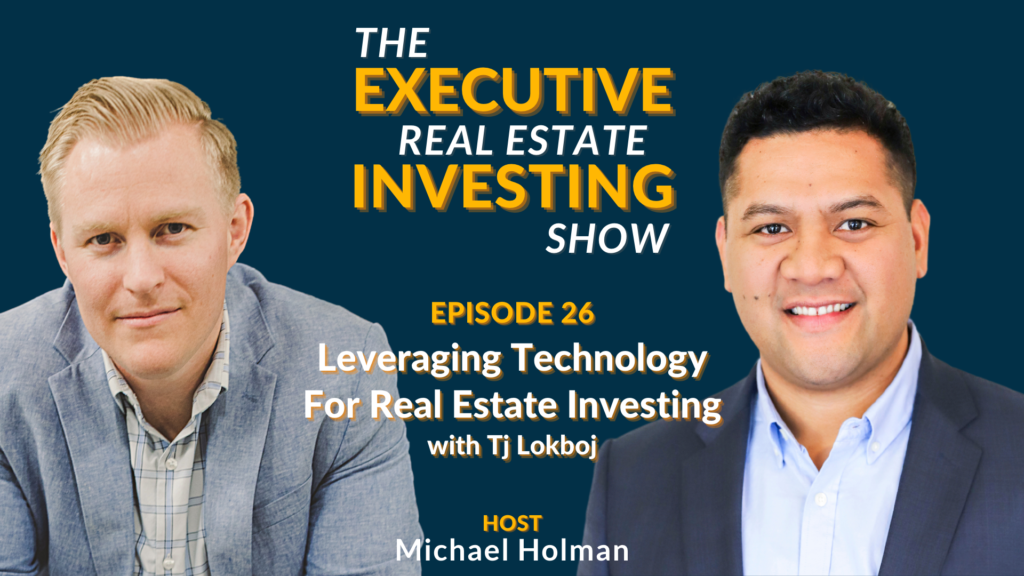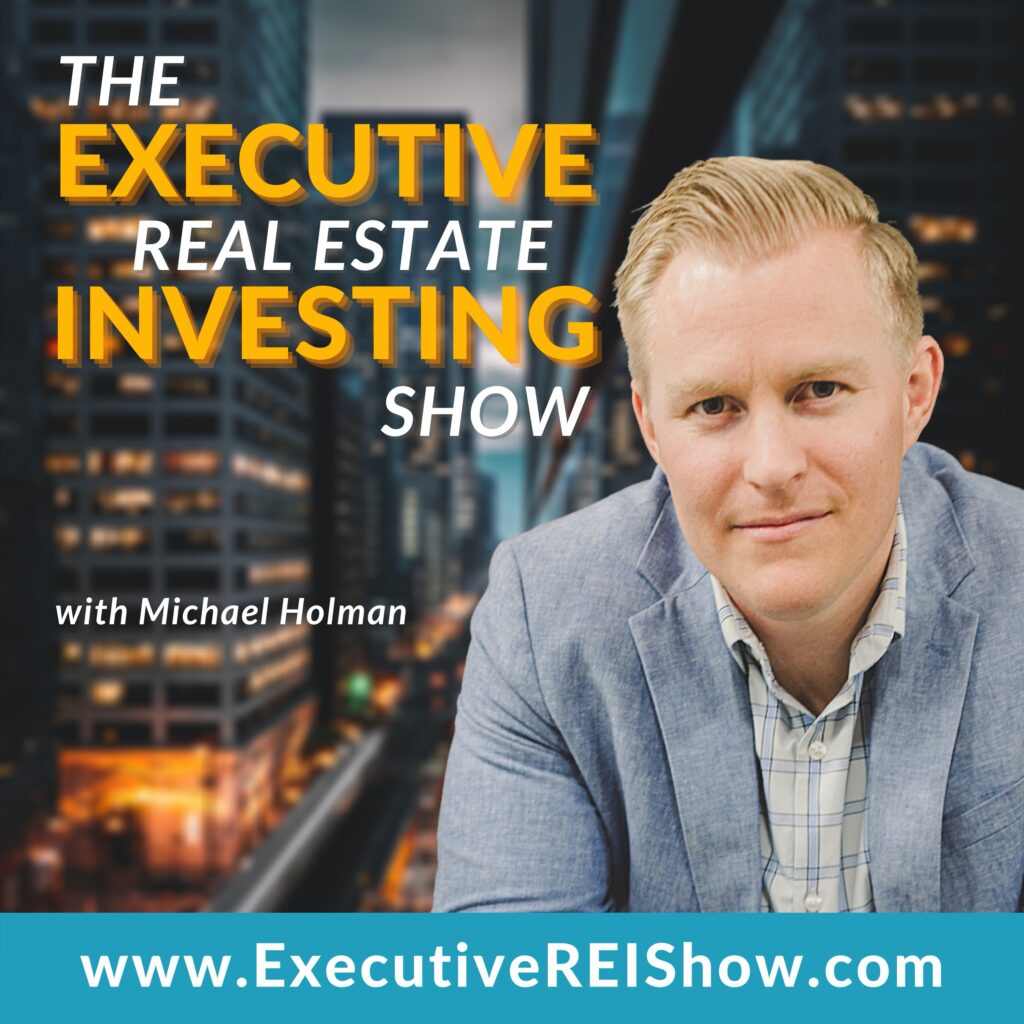
The executive Real estate investing Show
EPISODE 26
Leveraging Technology For Real Estate Investing with TJ Lokboj
- November 29, 2021
EPISODE SUMMARY
Born for Business: How a High School Drop Out Created An App That Is Changing the Real Estate Industry.
This week on The Executive Real Estate Investing Show, host Michael Holman talks with Tj Lokboj. Tj is the managing partner at Holdfolio, a premier real estate crowdfunding platform serving thousands of investors, with a portfolio of assets valued at $552M and holding multiple assets classes across 9 markets. He’s also the cofounder of SyndicationPro–the country’s fastest-growing investment management software solution, helping over 600 investment firms to raise capital more efficiently and better manage investor relations. It all started when the real estate investor became frustrated with the software that was available. So in 2014, he and his business partner took a gamble and created their own app. It was the right decision, and now Lokboj is a rare hybrid of tech startup guru and real estate investor.
Listen now to hear Tj’s amazing story. He’s gone from an immigrant who didn’t speak a word of English, to high school dropout working two jobs, to finally a software wiz.
EXECUTIVE TIP
Break Down and Understand Your Core Beliefs
LISTEN TO THE PODCAST HERE

The Executive Real Estate Investing Show Podcast
EP 26: Leveraging Technology For Real Estate Investing with TJ Lokboj
Listen on
READ THE TRANSCRIPT HERE
Note: Audio transcription has been automatically transcribed
Welcome to The Executive Real Estate Investing Show. This podcast is for you, the busy business owner or executive looking to create generational wealth. Here, we’re going to show you how to do that through real estate investing from multifamily to industrial and everything in between. You will become a real estate investing expert. And now, here’s your host, Michael Holman.
Michael Holman: Hello everyone. And welcome to another episode of The Executive Real Estate Investing Show. I’m your host, Michael Holman. We have a great episode with us today, we have TJ. He is phenomenal. I can’t ever say his last name now, I’ve known him for years. You’re going to hear that through this episode, but it is a really great episode.
He’s actually the founder of Syndication Pro. A lot of you’ve probably seen them around. So we’re really excited to get him on right before we get started, though we have to just make sure everybody here, if you’re liking what you’re listening to go ahead and hit that subscribe button on apple podcast, Spotify, wherever you listen to podcasts, you can find us there, leave us a rating and review.
We want to hear from you. And also, we want to make sure everybody knows and understands www.ExecutiveREIShow.com. You go on there, you can see the show notes. Even today, you’re going to see that we’re putting a lot of information in those show notes, a lot of resources. So you can go in there, you can connect and see what these people that we have on the show.
All these amazing people that are on the show, what they’re doing, what they’re up to, how to connect with them. So www.ExecutiveREIShow.com. And before we get into today’s episode, As always, we got to get into the executive tip. Today’s executive tip is breakdown your core beliefs. And what I mean by that is you have to understand what are your core beliefs, what’s at the center of who you are and what you believe, right?
Whether that’s, whether that’s religion or something else. Understanding of breaking that down. I mean, in today’s episode, you’re going to hear how TJs faith in his religion really was fundamental to his success. Not only just in life, but in real estate and in business and how he’s taking those lessons throughout.
So you have to be able to break down your core beliefs, right? Whether that’s, whether that’s faith-based or otherwise today’s executive. Understand those core beliefs, because that is what is driving you to succeed in life in business. And in other aspects of your life, let’s get into today’s episode right now.
Hello everyone and welcome to another episode of The Executive Real Estate Investing Show. I’m your host, Michael Holman, we’ve got a very special guest. TJ, you know what TJ, I am going to have to get you to say your last name for, because I know I’m going to mess it up. All right, TJ, what’s your say your last name for everyone?
TJ Lokboj: No worries. It’s Lokboj in you know, an English pronunciation is locked Bosch I’m from the Republic of the Marshall Islands. And so the pronunciation is bit.
Michael Holman: Okay. All right. But the English version is Lokboj alright. You know what TJ and I we spent some time together. I messed that up every time and I just need to apologize right from the beginning, but thank you for saying that what the ruin TJ is He has been a very busy man.
He’s an entrepreneur investor innovator. He’s the founder of syndication pro he’s the managing partner of hold folio. And correct me if I’m wrong, but you know, based on all your experience and your relationships, you’ve been on business, insider, Yahoo, finance morning star. Those are some, those are some big names.
TJ Lokboj: Just sharing those publications through our both companies, whenever we have a big milestones, we’re able to curate content and get on those and add value to the market with insights as well. So I’m also a member of the Forbes real estate council as well. So. My very best to add value with information and build networks as well
Michael Holman: that is awesome. So, you know, TJ got, and I got acquainted through a mutual friend just so happens. He has all these awesome companies as well. And, and, you know, at the time, I don’t even know if I really realized it, but, you know, TJ tell us, (inaudible), which one of those came from.
TJ Lokboj: Yeah. So interestingly enough, hold folio. The story of syndication pro, which is the software company. What we do is we help a real estate fund managers and syndicated syndicators. Streamline the process of raising capital and managing investor relations and where we add a lot of value on the cost side as well.
This is a technology that historically has been really built primarily in the beginning for large institutional level firms, where we saw an opportunity to democratize this technology to the masses. And you know, with the avenue, with the rise of both information and technology, we are seeing an opportunity to move the industry forward and you know help people adopt digital transformation to stay competitive, but awesome.
Hold folio came before syndication. We’re sponsors ourselves, so we, we were doing deals you know, back in 2014, right after the jobs act happened, we saw this awesome opportunity, Michael, to add value to the marketplace, but. Making it more accessible for investors to invest in private deals, but then after utilizing our own systems and processes, a lot of our peers in the industry are saying, how are you all tapping, tapping into crowdfunding and online investors?
And we said, we have this system that we developed from the software’s. We don’t recommend that you actually build it yourself. It’s just too crazy.
TJ Lokboj: So eventually we brought this to market. Now offer it commercially for investment firms looking to do the same. So that’s, that’s kind of the admin here.
Michael Holman: That’s fantastic. So whole folio you got that started, you said in, in 2014, what does, what does hold folio do and invest in right.
TJ Lokboj: We are already a fully vertically integrated firm. Our headquarters are in the Midwest, so Indiana, Indianapolis, Indiana, we self-manage and operate a lot of our assets in our local markets.
We started in single-family interestingly enough, so buying portfolios of single-family homes and then syndicating those with our network of investors. Eventually we wanted to grow with more Connie Connie’s of scale and, and have a higher potential return. So we pivoted and started focusing on commercial back in 2016.
However, since we’re really focused on technology right now, if anyone has ever been involved in a technology company, it’s it is a grind. It is full on all hands-on deck. So, what we decided to do was pivot our business model once again, and, you know, focus on expanding our portfolio and exposure to more deals by investing in other sponsors deals.
So to date, we’ve done 10 investments this year and all of these were great off market opportunities. Partnering with other sponsors who are really great and we’re placing our funds into their deals and coming in you know, on that partnership front.
Michael Holman: So you’ve done these, these 10 deals, you know, I mean, what’s kind of the average size of those.
So we talk in a couple hundred thousand, we are talking a couple million. I mean, what, what do you feel like what’s the average size of those 10 deals a year?
TJ Lokboj: all of our investments are in the seven figures, but you know, what we try to look for is scalability. You know, operations that have you know, a hundred units, plus that’s kind of our threshold and appetite when I’m making decision on, on an investment opportunity.
And so that’s, that’s kind of the thresh there. We’re invested in nine different markets are actually now to date. It’s 11 different markets over 19 submarket. And in multiple asset classes that include a multifamily, our bread and butter but also expanded into assisted living as well as new construction.
We have an appetite for storage units as well. Which is something that we’re looking forward to doing, but, but yeah, that’s kind of a, that’s kind of the deal. With our large network that’s what we leverage is we have an incredible loyal network of, of investors that have been with us since 2014.
You know, with the, using the power of the crowd. This is how we’re able to add value to our potential partners.
Michael Holman: that’s awesome. Well, I have to kind of take a step back right before we get really deep into the real estate. You know, a lot of our listeners, you know, they’re dealing with a lot of the business problems that, and concerns and questions and, and successes that you’ve probably had growing hold folio, growing syndication pro kind of going back to those, to those early days.
Just talk to me about what it was like starting these brand new businesses are coming on from these brand new businesses. What was that experience like for you?
TJ Lokboj: You know, in the early days with any startup or business venture I feel like a lot of the primary goal is, is to validate and get past the testing period.
And so this is a difficult time for most entrepreneurs to get through. There, I’ve already shared a few ways that we’ve already pivoted in our business, with hold folio times that by a hundred with syndication pro you know, you’re a tech startup, you have a vision of trying to add value in the marketplace and in the process of finding product market fit.
You really have to expect there to be constant iterative process where, you know, you’re testing and you’re failing and you’re regrouping and you’re just continuing to grind it out. And so, you know, it, I had never done a technology startup before. And, and boy does that kind of push you to kind of continue to focus on the value and the vision of what you’re trying to do to help push the market and the, or sorry, the industry forward. So I would say that you know, finding product market fit was a very difficult thing, but it’s, it’s something that is very, very a part of the process. And so I would just say trust the process when you’re in those early days and another important.
Part of this entire thing is to ensure that you’re working with the best of the best people who are also aligned with the vision and who are looking to build something great together and, and go through those trials. Those trial trialing those difficult times. Right? So.
Michael Holman: Yeah. That’s no, that’s awesome.
And I can fully attest to everything that you’re saying, TJ. I mean, I think about even I tell everyone we we’re, we kind of looked like a 40 year old startup. Right. That’s what you know the owner doesn’t have our company. Doesn’t love it that much but for me, honestly, I mean, we’ve had this exponential growth and we’re, and we’re kind of continuing on over these last four years.
And I’ve experienced a lot of the same things you have. I mean, even just narrowing it down to, you know, how do we get the money or how we get the development done? There are so many pivots that happen and you have to be willing to make those pivots and adjustments and keep moving forward. And not just throw your hands up in the air and say, well, there’s nothing I can do and it’s all over.
And I tried, you know, there’s always a way, I mean, I’m not saying don’t be reckless, but there’s always options to pivot, move forward, change directions, pivot. And, and I love you’re going through that process and talking about, you know, hey, hopefully. And syndication pro those are, I mean, those are established companies.
Those are well-known companies in this space. And, and to hear that, you know, Hey, we’re consistently and constantly trying to get better that that’s, you know, one of the best just overall general business advice that, that almost anyone could give is you have to be willing to pivot and move forward.
You mentioned that, and I love that you say that You know, kind of getting into into hold folio and into syndication pro a little bit. I mean, you talked, you talked a little bit about syndication pro. I want to spend just a second cause that’s really unique. You know, most people go from technology to real estate.
You’ve almost got real estate to technology. Right. And, and so what was the main motivation behind saying, Hey, let’s, let’s look at syndication pro. There might be an opportunity here. What, what does that mean? Motivate.
TJ Lokboj: Yeah, absolutely. So, as I mentioned while we were, you know, growing in our business with withhold folio and there was a lot of our peers who were asking like, Hey, how, how do we kind of develop what you’ve developed on the tech side?
And we’re not technologists ourselves. We know, like very intimately the jobs to be done for real estate syndicators and fund managers. And so this gave us an opportunity to kind of look at what was out in the marketplace. And after looking at a lot of, of the incumbent and well-known solutions that are out there we realized that there was an opportunity to number one, simplify what was being used.
You know, Michael in our industry, not only are we kind of a slow beast in, in terms of adopting digital solution that I think that a lot of it is because, you know, operators want to keep things simple, right? Our business is finding deals and compounding capital for our investors, right. We don’t want to spend too much time and figuring out an entire system.
Or, or, or setting up implementation that will take six months, right. That’s just, you know, interesting to us. And so what the goal was to is to create something that was just stupid, simple for sponsors and their investors to operate on to you know, really streamline that process of working together.
And so we saw a gap in the market and we knew that if we. Focus on making something simple and more affordable and accessible and more streamlined that this would make a huge impact and there would be a huge demand for it. And this was a problem for our peers. And so you know, testing it out we were able to get immediate positive feedback.
We grew from zero to 600 firms very, very quickly and another thing that a lot of our customers resonate with is because we’re sponsors ourselves. We’ve developed the systems to follow jobs to be done. This is a business theory, a term that I use jobs to be done is focused on, you know, the actual jobs that you hire a product or service for.
And, you know, we wanted to keep two things in mind. How do we help people raise capital more efficiently? And how do we help. Focus on growing their business. If the features didn’t serve those two things, we’re not putting it on. There just one example was, you know small, small, but important innovation was, you know, automated, ACH distributions.
Yeah, this a lot of folks were, you know, in our industry, they’re still sending physical checks to their investors, which is fine. But when you have people who are moving around and you get checks, balances, and things like that, You know, we’re in a day and an age where that should have been automated a long time ago. So I agree.
Michael Holman: They were like, oh man, finally, now
TJ Lokboj: Great. Well, this is a, this is one part that we can add value to, but there’s all these small things, Michael, that that, you know, we’re really excited to innovate in within our space. But the last thing I’ll mention, I had a, I had a recent call with one of our customers because we are sponsors or sales.
We started in the real estate side and we partner with a technologist to develop syndication for. We offer this level of service that real estate fund managers are well customed to one of our customers reached out. She was having problems, setting up her e-sign documents in our system. You’re able to upload them, automate that process.
Well on their end, they had messed something up and she just couldn’t figure it out technology. She’s like, I don’t know how to do this well, it was on a Saturday afternoon. This is how, you know, with deals when you’re raising capital and trying to get deals done, urgencies, everything, which I understand.
So she calls my direct cell phone. Michael, I pick up the phone and I say, I just need to sing happy birthday to my daughter real quick. And then I’ll, I’ll jump on and help set it up for you. And that’s what I did. And that’s what we’re kind of becoming synonymous with is the guys who will get stuff done.
And so I think aside from the technology, it’s just being a strategic partner and working with. Our customers in a way where we’re sponsored obsessed because we are sponsors ourselves. So anyways, love it.
Michael Holman: I absolutely love it well, you know, your sponsors yourselves and you’re working with a bunch of different sponsors, you’re sending all these publications into, you know, all, like I said, Yahoo, finance morning are business insider.
You know, these are all really big names. I’d love to start getting kind of your insight and intake on the real estate market. You know, a question that comes up quite frequently nowadays is where are we at in the real estate cycle? And I know this is a crystal ball question. So I’m going to ask you, you know, take out your crystal ball, give us, just give us your opinion.
You know from the information that you’ve collected, where are we at in the real estate market? Where do you see things kind of going in the next, you know, one year, five years down the road?
TJ Lokboj: I’m no economist. I won’t pretend to be, I think that for us in our focus you know, what we’re, what we’re looking at is that, you know, obviously the market’s become extremely competitive.
Right? My goal especially on the multifamily front, which is the asset class that we focus on with compressed cap rates as well. So Fortunately because of our business model, we are seeing a trend where, especially in the syndication realm syndication, it could be a combination of multiple firms or partners, co-GP on opportunities.
And so leveraging your network to find those right deals. Your dad actually can shared a quote that stuck with you throughout my entire career. And he was, I listened to him on a par in a podcast and in the podcast, his, his advice was when you’re doing your first deal, focus on getting the best deal.
Don’t you, you get antsy on trying to find opportunities and get a deal done. Just focus on the right deal and the best. And that’s kind of what we look at when looking at opportunities right now and into the future. So I still hold true to that, you know. So thanks to your, dad’s a phenomenal leader here in the valley here in Utah, but he’s also a huge pioneer and everyone looks up to him.
So anyways, I wanted to plug that in cause it’s so true. Yeah. And we just stick to our criteria is. You know opportunities that have great risk adjusted returns, strong cash flows, which is our PR that’s the type of investors we are. And so if we can try to calculate or predict the cashflow side looking into the future, that’s what we do.
And then also the best ways for us to mitigate risks is the partners, the operation to. Making sure we’re working with the very best of the best in phenomenal markets, really great markets with great job diversity you know great population growth. Those are the things that everyone focuses on, but those things are fundamental.
And then I would say looking into the future you know, 2020 2019, 2021, people have just kept talking about things, being overpriced, things, being overheated in the real estate world. If you can find great opportunities, then it’s better to be in the market than be out. You know what I’m saying?
Yup. You’ve seen a lot of opportunities where we’ve gone full cycle and a lot of our deals this year that we’ve you know that we acquired a couple of years ago. So shorter, time in full cycles. And that there’s the opportunity there of doing exactly or a refi. So there’s always going to be opportunities for you to capitalize on in any market.
So I don’t know where we’re at to be honest, but I know that we stay true to our fundamental core values. And one of them I would say is very based off what your dad shared. It’s just focused on great deals. That that’s what you need to focus on. Love it.
Michael Holman: Sage advice, Sage advice. Well, I want to kind of zero in on one of the things that you mentioned, right?
And that’s being focused in on really great markets, really great cities, you know, where. Obviously, you’re expanding, but where right now, I mean, if you were to give your, your top five lists, you know, or your top seven list of, of markets that you’re excited about right now, what would that be?
TJ Lokboj: So we’re still really loving the Midwest. And just because we have a lot more control, we understand that as our backyard markets. We love Kentucky. We love Cincinnati. You know, and, but there’s a lot of great opportunities in the, in the Southeast as well.
We just closed up on an opportunity and in Florida as well. So yeah, I would say that where we have the strongest boots on the ground is for we’re focused on and we’re always also expanding. The development side, I know that you all are killing it here in the inner mountain west.
And so we’re looking forward to seeing opportunities there too, man. Absolutely.
Michael Holman: This is great.
TJ Lokboj: We love places like in, in, in, in Texas where technology is booming as well. North Carolina is another great market here in Utah, as well as an Idaho St. George. Those with the technology hubs that are just positioned to grow and expand.
I think that that, that right there is a strong indicator on the, on the job sector side that we, we look forward to.
Michael Holman: I love it. So, yeah, no, that’s, that’s really great. I love the focus on some of those, some of those technology. I mean, we’ve seen that those. Technology centers often become, you know, hubs and employment centers, which is obviously one of, if not the main driving factor for multifamily growth and multi-family occupancy.
So, you know, that’s, that’s a really great little insight. I’m going to throw a curve ball at you on that as well. What, what is one market that you’re not in, that you wish you were in or that you want to.
TJ Lokboj: One market that we’re, we’re not in that way. We, we wish we were in is here in Utah and maybe down south there in Phoenix as well.
You know, with, with the net migrations, especially since last year with Californians going up upstream, you know, there’s a lot of opportunity for growth on the population side, the job front overall And so we, we actually are not invested in personally I have a couple of small multi-families here and you talk, but and you we’ve seen such a, such a, an incredible growth there, but I would love to find more construction development opportunities here in the inner mountain west.
That would be wonderful. That’d be awesome.
Michael Holman: Well, Austin, TJ, you and I’ll talk afterwards, but cause everyone, he, everyone listening to this show and they know that’s our bread and butter, right? I mean, we’re, we’re all about development and we’re all about the inner mountain west, especially Utah, Arizona is our, is our main markets
Kind of shifting gears, just, you know, just a little bit I want to talk a little bit about, you know, just some of the, maybe the challenges or some of the things that you’ve had to overcome. And one of the things that kind of come to mind is just. How do you know, I’d love to hear how you kind of navigated even going back to the very beginning, how’d you how’d you overcome the challenges of, of immigrating because I know you and I were talking earlier, you actually immigrated to the us from the Marshall Islands.
You know, what did you overcome during that process that maybe is this helped you, you know, through these startups and through these investments with real estate?
TJ Lokboj: I was originally born in the Republic of the Marshall Islands, my family and I, we moved here to America in 1995.
I didn’t speak English and so none of us did. And so I was about five years old and you know, come into this new my island, Michael is two football fields. Oh my goodness one road throughout the entire. So when we flew over lax in 1995, I looked down and I saw all those lights, man. I literally thought I was in another planet, but my mom, she was a, she was a small micro entrepreneur who owned little huts you know, stores in different villages.
She literally sold everything for tickets to come to the U S and we live with my aunt for about two or three years while we were saving up for our first home or a apartment. So I grew up, this was my childhood up until I moved out of my house, but we lived in no less than a thousand square feet with eight people in the house, two room bed, one bath.
And that’s impressive yeah, that’s how I grew up, man. My dad, he left our family and passed away when I was 13 years old. It was a difficult time for me because, you know, I was trying to find my way in, in life in China. You know, we were homeless at one point in our lives as well. When, when you know, when, when we couldn’t pay rent.
What happened was I, I kind of struggled for a long time and I actually dropped out of high school. Most people don’t know this, but I left high school and I started working so that it can help provide for my mom. I was working two jobs you know, as a 17-year-old. And that was one of the best experiences of my life because it gave me a lot of confidence.
But Michael, this was also the time where I was able to meet with two amazing young men missionaries for my church came and taught me about faith and, and hope. And this was a, this changed my life I was able to literally do a 180 and you know, was able to get married to my sweetheart. I served a church mission just like they did it for two years and that.
The single thing that got me through every rough time in my life was, was this renewed faith in, in that there’s a plan. And so I would say regardless of what faith people are in, I think that holding strong to, you know, true principles and principles that help you serve and be, have a proactive and a strong mindset.
That that’s the one thing that changed changes people’s lives. That’s what’s gotten me out of poverty and I’ve seen it with so many different people. So, yeah, that’s kind of in a nutshell, the story,
Michael Holman: And I really appreciate you sharing that with us. I mean, Kind of even fast forwarding to today.
I mean, how do you feel like those experiences are? What lessons did you learn from those experiences that are helping you right now?
TJ Lokboj: I would say that, you know, character is probably the most important thing when doing business you know, knowing that you’re working someone who stands behind their beliefs.
And also who’s focused on living true to those principles that they believe in is so important. So you know, when I started syndication pro and I was working with my partners, I only had one. I said I don’t work on Sundays so just expect that. And that is one thing that I ask is that you don’t send me emails, nothing on Sundays.
And I know this is a small thing, but it’s so important for me to always hold true. I think that builds confidence in those that I work with and those that I serve within my company’s. Is that they, they know who I am and I’ll always tell them straight. And so that, that’s one thing that is really helped me and I, and I try to find the same thing with working with other people is folks that are, are good trustworthy and who live, whatever principles that they hold true to themselves.
It doesn’t mean they have to be in a religion or whatever. I just, I just feel like character and living in operating on principles is founded.
Michael Holman: So yeah, no, that’s, that is honestly really, really wise advice. And I, and I highly recommend that. I mean, we’ve I know, you know, us here at Overland and myself.
I mean, we have partnered with many, many people throughout the years and it’s, it’s those that have a high level of integrity. Always, you know, they work out everybody and it’s not that those, those deals, those partnerships are flawless, but we’re always able to work through any of the issues.
Right? There are both parties are open. Both parties are trying to to work together and show integrity. And that’s really important, I mean, if you’re, if you’re just getting into a deal, whether you’re wanting to be an active investor and partner with others to actually be the sponsor or whether your aluminum partner, you know, and you’re just interested in investing passively into syndication, either one of those scenarios.
I think it’s really because you’re essentially entering, I mean, you’re entering into a partnership and you need to understand who it is that you’re investing with investing alongside with so that you can make sure right. That at the end of the day, even if things don’t go perfectly. Or whether they do go perfectly, you can know that everything is being done appropriately and respectfully, respectfully, and all of that.
TJ Lokboj: a hundred percent, man. I love that. That’s awesome.
Michael Holman: So, TJ, I just kind of want to wrap some things up. There’s two questions. We ask everybody who comes onto this show and I’m going to shoot them to you right now. First off, what is the best business advice you were ever given? Yeah,
TJ Lokboj: I would say man, four, four, I would, I, I’m not even trying to butter you guys up, but your dad’s,
Michael Holman: it all comes down to the,
TJ Lokboj: to finding the best deals and offering the best service to your investors on that front. Basically what I would boil that down to is just do things right. And focus on. So that is a really good advice is on your first deal, but I would extend it to on every deal.
Don’t rush it, just get the right one. I would also expand that to partnerships. You know, don’t rush the partnerships, you know, every time, you know, on with my experience of investing in different things. You know, like for example, buying my a small unit here in, in the valley, whenever there was a problem that went wrong, it was because someone didn’t do what they said they were going to do.
And so take time in, in developing those partnerships and get those right. So I would say, man, that. That’s great advice right there, man.
Michael Holman: No, I love it. Well, I mean, you might’ve answered a little bit of this, but I’m going to ask you anyway, what real estate investing advice would you give other business owners or business executives?
TJ Lokboj: for a lot of the theme that we’re talking about overcoming challenges. Being resilient through tough times, being flexible being flexible and pivoting. I would say that, you know, your features as, as, as bright as your faith, just have faith in yourself, have faith in your team and persevere continue to work in.
And trust the process and all things we’ll, work out if you if you work hard and, and do those things real estate, the real estate game, as you mentioned, is, is it’s not, it’s not difficult. It’s, you’re, we’re here as stewards and adding value and serving people. And so yeah, your, features as bright as your favorite.
Michael Holman: You know, that’s, I feel like I need to get a quote of that to go put on, to go put above my door or something, you know, touch it every time I walk out of my office, that was that was fantastic.
TJ Lokboj: Yeah, they could find me on Instagram as well as on LinkedIn.
Or if they want to visit our websites, my website. Hold folio.com or syndication pro.com. And so we, we help both on the LP and sponsors we’re really focused on the sponsor side helping people with syndication pro. So I’m here to add value and yeah, that that’s. The avenues you can find me.
Michael Holman: And for everyone listening, we will have those in the show notes. You don’t have to write those down or memorize and just go to www.ExecutiveREIShow.com, go find this episode, click on it, and you’ll be able to access all of those websites and we’ll make sure that all those social media handles get on there as well.
Well, TJ, thank you for being on the show. Have a great. You too, brother.
TJ Lokboj: Thanks so much, Michael.
Thank you for listening to The Executive Real Estate Investing Show. Ready to learn more? Go to ExecutiveREIShow.com for more episodes and resources to help you create generational wealth through real estate investing. That’s ExecutiveREIShow.com.
WATCH THE EPISODE HERE
MENTIONED IN THE SHOW
- Connect with Tj Lokboj!
- Holdfolio Website
- SyndicationPro Website







